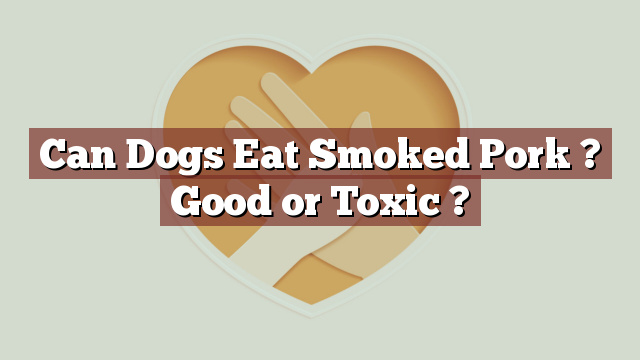Can Dogs Eat Smoked Pork? Good or Toxic?
As responsible pet owners, it is crucial to be aware of the foods that are safe for our furry friends to consume. While dogs have a reputation for being able to eat almost anything, certain human foods can pose serious health risks to them. One such food that often raises questions is smoked pork. In this article, we will explore the nutritional value, safety, potential risks, and benefits of dogs eating smoked pork.
Nutritional Value of Smoked Pork for Dogs
Smoked pork is a protein-rich food that contains essential amino acids necessary for a dog’s overall health and well-being. It is also a good source of vitamins and minerals, including iron, zinc, and B vitamins. However, it is important to note that dogs have different nutritional needs than humans. While smoked pork may provide some nutritional benefits, it should not be a regular part of a dog’s diet.
Is Smoked Pork Safe or Toxic for Dogs?
No, smoked pork is not safe for dogs to consume. The process of smoking pork often involves the use of various seasonings, spices, and additives, such as garlic and onion powder, which can be toxic to dogs. These ingredients can cause gastrointestinal upset, including stomach pain, vomiting, and diarrhea. Moreover, the high sodium content in smoked pork can lead to dehydration and other health issues in dogs.
Veterinarians advise against feeding dogs any form of smoked or seasoned meats, as they can potentially be harmful. It is always best to stick to a balanced and specially formulated diet specifically designed for dogs.
Potential Risks and Benefits of Dogs Eating Smoked Pork
While smoked pork can provide certain nutritional benefits for dogs, the risks associated with its consumption outweigh any potential benefits. Dogs have different digestive systems and metabolic processes compared to humans, making it difficult for them to process and eliminate certain substances found in smoked pork. The presence of harmful seasonings and additives can cause significant harm to a dog’s health, leading to serious complications.
Additionally, certain dogs may be more prone to allergies or sensitivities to pork. Consumption of smoked pork can trigger allergic reactions, including itching, skin rashes, and respiratory problems in such cases.
What to Do if Your Dog Eats Smoked Pork
If your dog accidentally consumes smoked pork, it is important to monitor their behavior and look out for any signs of discomfort or illness. If you notice any symptoms such as vomiting, diarrhea, or lethargy, it is crucial to seek immediate veterinary assistance. The veterinarian will be able to provide the necessary treatment and guidance based on your dog’s specific condition.
Conclusion: Smoked Pork Should be Avoided in a Dog’s Diet
In conclusion, smoked pork is not safe for dogs to consume due to the potential toxicity of seasonings and additives used during the smoking process. While it may contain some nutritional benefits, the risks of gastrointestinal upset, dehydration, and other complications outweigh any potential advantages. As responsible pet owners, we should prioritize our furry friends’ health and well-being by feeding them a balanced and appropriate diet designed for their specific needs. If you have any doubts or concerns regarding your dog’s diet, it is always best to consult with a veterinarian for professional guidance and advice.
Thank you for investing your time in exploring [page_title] on Can-Eat.org. Our goal is to provide readers like you with thorough and reliable information about various dietary topics. Each article, including [page_title], stems from diligent research and a passion for understanding the nuances of our food choices. We believe that knowledge is a vital step towards making informed and healthy decisions. However, while "[page_title]" sheds light on its specific topic, it's crucial to remember that everyone's body reacts differently to foods and dietary changes. What might be beneficial for one person could have different effects on another. Before you consider integrating suggestions or insights from "[page_title]" into your diet, it's always wise to consult with a nutritionist or healthcare professional. Their specialized knowledge ensures that you're making choices best suited to your individual health needs. As you navigate [page_title], be mindful of potential allergies, intolerances, or unique dietary requirements you may have. No singular article can capture the vast diversity of human health, and individualized guidance is invaluable. The content provided in [page_title] serves as a general guide. It is not, by any means, a substitute for personalized medical or nutritional advice. Your health should always be the top priority, and professional guidance is the best path forward. In your journey towards a balanced and nutritious lifestyle, we hope that [page_title] serves as a helpful stepping stone. Remember, informed decisions lead to healthier outcomes. Thank you for trusting Can-Eat.org. Continue exploring, learning, and prioritizing your health. Cheers to a well-informed and healthier future!

